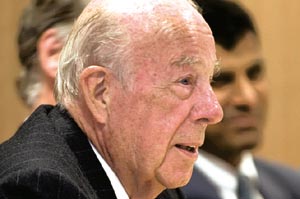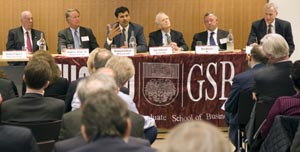Shultz, faculty discuss oil dependence at GSB London Center opening event
By Allan Friedman and Melissa BernardoniGraduate School of Business
 Former U.S. Secretary of State George Shultz (at left) addresses those who attended the opening of the Graduate School of Business London Center Monday, Sept. 12. Shultz was a member of a panel, which also included members of the GSB faculty and alumni community. The group discussed energy, geopolitics and the global economy. Edward Snyder, Dean of the GSB and whose endowed chair is named for Shultz, moderated the panel discussion.  | |
More than 350 alumni and friends joined Edward Snyder, Dean of the Graduate School of Business, and GSB faculty members to celebrate the opening of the Chicago GSB London Center on Monday, Sept. 12.
The GSB relocated its European campus from Barcelona to take advantage of London’s high concentration of corporate headquarters, said Snyder. Classes in the executive M.B.A. program in Europe are now taught in the Center. In addition to the North American executive M.B.A. program at Chicago, the executive M.B.A. program in Asia is based in Singapore.
The center’s opening included a panel discussion on energy, geopolitics and the global economy led by former Secretary of State George Shultz and moderated by Snyder, the George Pratt Shultz Professor of Economics in the GSB.
Shultz, who once served as Dean of the GSB, made a case for reducing oil dependence in his presentation, stating that Americans’ appetite for oil feeds terrorism. “How many times will we be hit in the head with a two-by-four before we make a really determined effort to use less oil?” asked Shultz.
Joining him in the discussion were Nobel laureate Gary Becker, University Professor in Economics, Sociology and the GSB; Nick Butler, group vice president of strategy and policy development for British Petroleum; Kenneth Crews (M.B.A.,’74) managing director of Greenhill & Co.; and Raghuram Rajan, who is on leave from his position as the Joseph L. Gidwitz Distinguished Service Professor of Finance in the GSB while serving as economic counselor and director of research at the International Monetary Fund.
“Hurricane Katrina showed us the risks if one part of a complex international system that supplies energy to six and a half billion people worldwide breaks down, even for a short period of time,” Butler said, noting that Katrina wiped out 900,000 barrels of oil a day and damaged six of the American Gulf coast’s refineries. “That risk doesn’t end with Katrina; there are other risks.”
In fact, according to Shultz, the devastation of Katrina would look like “child’s play” compared to a massive terrorist attack. The time to start systematically solving the problem, he said, is today. “Now we are seeing an unusual confluence of people who are worried about the environment, people worried about economic pressures, and people worried about what happens if you suddenly have a cutoff of what you use to move your vehicles around,” he said. “While they differ in what they worry about, they’re very similar in what they think should be done about it. This is a moment to seize and get something going in a positive direction.”
Panelists also discussed the shortage of refineries, the three oil crises since the 1970s, and the flexibility of the economy.
After the panel, Snyder welcomed the audience to the London Center with a toast and reception that featured tours of the new facility.
Ninety-one executives representing 37 countries in Europe, the Middle East, Africa, Asia and Latin America are enrolled in the GSB’s 12th executive M.B.A. program in Europe—and they are the first group of students to use the school’s new London facility. Classes began at the new campus, located in the Woolgate Exchange, 25 Basinghall St., on Monday, Aug. 1.
The executives starting the program include a partner with Ernst & Young in the Netherlands, the national sales director from Citibank in Egypt, the marketing director for Gillette in the United Kingdom, and the chairman of Rosevrobank in Russia.
Other students include an internal auditing manager for the Sultan Center Company in Kuwait, the vice president for global sales and marketing for Alcatel in France, a brand manager for Bayer in Switzerland and a project manager for the African Development Bank in Tunisia.
“We are encouraged by the strong interest in our program in London from executives and from leading corporations throughout Europe and other areas,” said Snyder. “This is a unique learning system.”
Sixty-eight of the enrolled students live outside the United Kingdom, including 11 executives from Germany, representing the largest group of students from one country outside of the United Kingdom. Ten students are from Russia, eight are from Spain and seven are from Switzerland. Other students are natives of India, Denmark, Israel and Poland. All of the executives continue working in their careers while studying for their M.B.A. degrees.
University faculty members teach the London courses and include renowned GSB scholars from economics, finance, accounting and other disciplines.
The students, who participate in 16 one-week modules over 20 months, will take courses at the campuses in Chicago and Singapore during three of those 16 weeks of classes. In addition, students from the Asian and North American programs will travel to London to join the European-based students. This coursework model allows students to spend one-fourth of the total classroom hours studying with executives from other parts of the world.
The typical student in the program is 35 years old and has 11 years of work experience. More than one-fourth of the students are working in the finance and banking industry, while one-sixth are management consultants.
![[Chronicle]](/images/sidebar_header_oct06.gif)